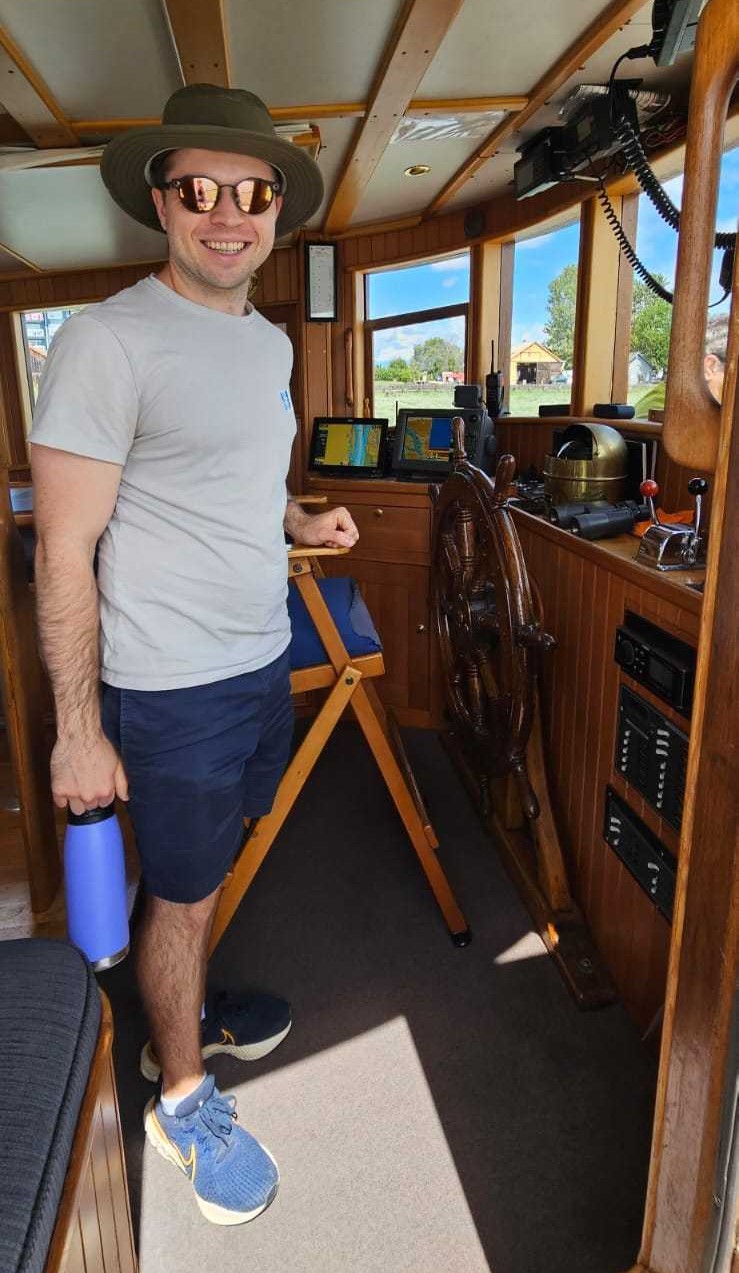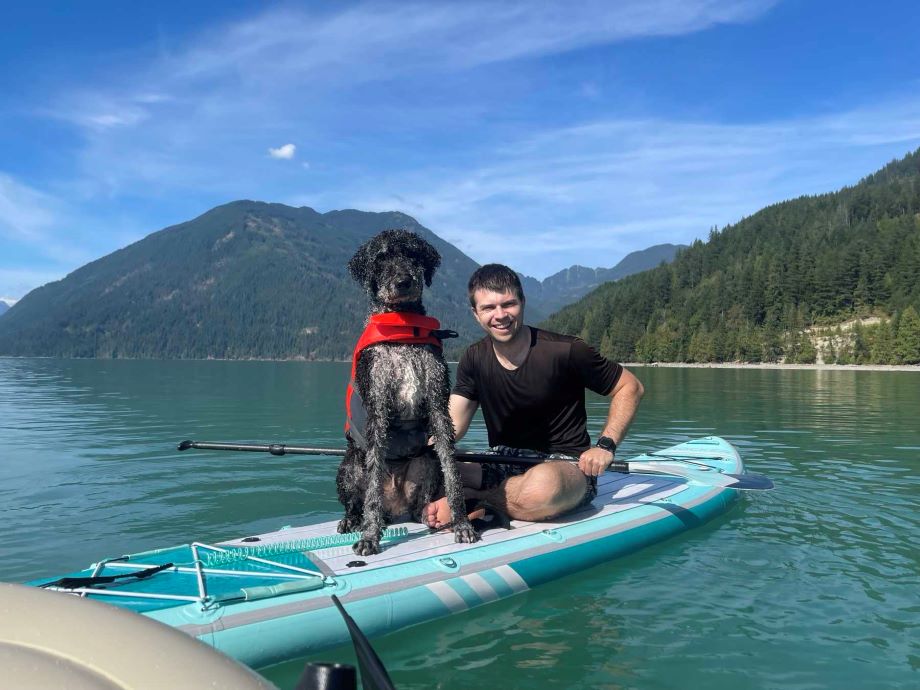
By: Sophie Allen Jun 25/2025
In this installment of Interviews with the Experts, I got to speak with Jeremy Mayer, our always busy but never so busy he can’t answer a question Director of Operations. I’ve tested this a lot over the years, as Jeremy was the one who taught me almost everything I know about SEO and always had time for my many questions. This interview, then, is not that different only instead of answering all of my SEO-related queries and helping me seek the answers, these questions are all about him. If you’ve ever been curious about Snaptech’s Director of Operations, what he does in a day, or wanted to learn more about marketing (and Jeremy) in general, please read on.

I oversee the day-to-day management of the marketing department and team members, while also contributing to and executing on the bigger picture tasks – things that Flavio or the leadership team come up with. There’s a whole variety of things in there. Day-to-day is everything that we do with the team–I’m making sure that we do the marketing team meetings on a weekly basis, that projects stay on track, and, while I don’t oversee any of the team’s specific tasks, I do have some interaction still on clients and projects with team members.
Bigger picture things from an administrative side, you’ve got the HR initiatives that we’ve rolled out, new HR documentation and coordinating that prior to having an HR person help us out. Part of that was just actually coming up with some of the documentation that we have now. Looking at my task list now, none of it is due tomorrow, but it all needs to get done. I don’t have the same level of urgency with my tasks.
On a more granular level, what does a typical day look like for you?
Meetings and administrative tasks, mostly. Kind of like what I was just talking about, working on admin for team members and the company as a whole. That includes a lot of meetings, particularly since we’re virtual. The leadership team sorts out things on a monthly basis, and that will be spread out over my month as well. But outside of that, we do corporate marketing meetings twice a month, we have daily huddles, and the marketing team meeting once a week. I have individual team meetings with other heads of department. When I’m working on HR processes, I’m meeting with the HR person to make sure that she has a full understanding of how we do everything at Snaptech so that she can put that all into the documentation.
Then filling in those times without meetings with admin stuff or client stuff that comes up, too, because I’m involved with some clients. I have some client meetings, probably only a few times a month these days, responding to client emails, checking in, and assisting other people with responses sometimes. A lot of mixture in there, as well as organizing and implementing cross-team processes, looking into the things we need to do as a team to improve on or things that we need to have more standardized and then figuring out how we roll that out. It’s fun, it’s a good mixture.
From marketing, you get to see the tangible impact that your role has, particularly with the kind of agency that we are; we see where the impact is for the clients that we have. You also get exposed to a wide variety of different industries, which is always fun.
I feel like if you are either client side for marketing or even just working another role, you don’t get that exposure to see everything that is out there that we do in marketing, because we have to understand people’s products and services and who they are as a company as well. We had a company quite a few years ago, one of my favourites of all time so far, K9 Clean. They had paper dog poop bags, again something that, other than if that ad showed up in your Instagram feed–which is what we’re there to do–you would never have known that it was a niche that people are trying to get into with their products.
It’s really cool to have that diversity in there, and then at an agency, the people you meet as well, we have some very good clients and their personalities that you meet, they are fantastic, but also the team that we have.
Realistically, it’s working with the team. We have a fantastic team of personalities, and they bring something special to the table and make it super enjoyable to work at Snaptech, and because my role involves so much team coordination, helping them advance their careers and figure out the directions they want to go in. Definitely, the team is what makes Snaptech what it is, and such an enjoyable place to work, even on those tough days, it’s the ability to have Fun Fridays with the team or just reconnect that makes it really worthwhile.
Really, I think for this, it tends to be the bigger decisions that sometimes come from being in a leadership role. We have a much better balance, I think, as far as leadership goes, over the past few years and in terms of being able to either address issues or bring up problems and generate those solutions, or even just generate positive things for Snaptech. But ultimately, you’re a single person, once you reach my level of role, and so some of those decisions, ones that you have to make yourself, there isn’t somebody else there to discuss it with. There isn’t a large support network for it, and so I have tried to build a lot more of that for the decisions that were made over the past few years or to help with those decisions. It is sometimes challenging that you have the final say on things that need to happen because sometimes with those decisions, there will be a little bit of polarity in how they are received by some people versus others. You know that you’ve got to make a decision for one, and it’ll probably impact someone else.
Going off script, if you had complete power to say yes or no to something, what would you want to see happen at Snaptech?
I think that everything we do currently works for our agency and works for our clients, but sometimes there are moments when you feel like, at an agency, it would be good to have a bit of a reset and be like “this is what we look like now, this is probably what we’re going to look like for 6-8 months. How are we going to shape ourselves into being able to continue to move that forward and focus without pauses on some of the things that we do at the moment?”. So kind of figure out how that would work so that it feels like there’s a bit more direction to it.
Not quite a yes or no, but I think having consistency to a certain extent with some of the initiatives and company direction that we have and making sure that we continue with that and being able to better define what we already kind of do. There seem to be things that throw us off that consistency, particularly external factors like the economy. Also define what our limits are going to be with the changes in the industry, I think particularly for what you and I have talked about [in the past] with AI, making sure that we still need to embrace it but how we can do that in the best way possible rather than having a free for all.

I think understanding is one that came out as I was thinking about this earlier. In many cases, we have, as a team, the ability to work with so many different personalities and work styles, and you’re never going to have a team that is uniform in how people work and the different personalities that you have in there. So I think being able to have that understanding sometimes, even if you don’t like it, but you are able to understand how somebody’s doing something else or why they’re doing that and just kind of accept and work within those parameters. I think that’s one of the really key things for a good team, and especially a good team working together.
Organization is my second one because me being me, organization is really important. I think as far as the team goes, making sure that people stay on track with their tasks, hit deadlines, but I also think organization tends to go beyond that. I think that’s a very corporate-centred kind of mentality for just hitting deadlines. I think organization can really help you to avoid stress and burnout to an extent, but sometimes over-organization can lead to burnout, a little bit, too. But if you’re able to see when things are going to fit in, and when you’re going to get everything done, and then if you don’t end up with that stress is like “oh my god, I’ve got a task list of 1000 things long,” but if you can organize that, you know when to delegate things and ask for help, then I think it helps. Also, just from a mental health and stress perspective, too.
The third thing is pretty common, I think, which is company buy-in. I think you need to be able to have team members who are brought into what the company’s vision is, whatever that may be. So that in those moments where things are a bit more challenging, they also have a bit of self-motivation to keep going because we know what we’re working towards. I think it doesn’t matter what company you work for, you will go through those ebbs and flows of that motivation factor, but having some kind of company buy-in is super important.
I’m ultimately responsible for everyone that we have here, even if it’s not on a granular basis, it is on a more general basis, so I genuinely think that I work with fantastic people, with great personalities, and I enjoy working with everyone. I stay motivated doing what I do because so much of what I do is admin or helping people out or helping facilitate people’s educational learning and career journeys to an extent, so that’s really what motivates me.
This is a tough one to think about, because in the past, what I’ve told interns and people who’ve asked me about advice is to be open to anything that comes up. Say yes to all the opportunities that come in when people ask you to help with projects and tasks that you may not usually do. That’s how I got such a diverse background in marketing and the opportunity to do SEO and other marketing tactics as a specialist. I’d just come from Paid and was asked to help out with digital assessments and had to start looking at the analytics accounts a lot deeper and identifying SEO and then looking to see what other kind of random tools were out there that could help you analyze their competitors and see what kind of marketing they had and put all that into a report.
But you’re asking what recommendations I’d make for myself, and I’d already done that, so I think the advice I would have made for myself is around the feeling of imposter syndrome that we all tend to have, particularly in marketing. There’s always a feeling that, because there’s so much information out there, you feel like you’re not quite sure what you’re doing is right or that people might know better, particularly when you get into those client communication instances. I think early on in that client communication journey and learning how to do things, you’re nervous in front of the CEO of a company or the Head Marketing Officer but the reality is, is that as you kind of get along, most people are also just figuring out as they go, particularly in the more senior things because so much of that just falls on decisions. It comes from some experience, but if you’re on the same level, you’re mostly just figuring it out. So if you know how to leverage resources and you know how to use what you have already learned and apply it, you can be relatively successful before that, or you can complete what you need to do.
From the paid side of things, if you come from Google Ads and there are all these other different ad platforms, they’ve all been developed with similar nomenclature and similar structures. You’ve got one level and then underneath that are smaller levels for how you target things and in the beginning you’re like, “oh somebody needs to teach me the platform” but if you have that Google Ads knowledge, you can dive into any of them and apply what you know and then just create yourself as you go to figure out what the differences are.
So that’s definitely the piece of advice I’d give myself.
I really think it is going to change a lot of what we do. I mean, it’s already changing a lot of what we do, but even just the way that search might work and the way that we as people look for things. I think that’s all going to change quite a lot and it’s very hard to see and predict what that will look like because things do change at such a rapid pace, like when ChatGPT came out, everyone though that this was the end of search engines, but we’re 2-3 years on from whenever that was launched and search engines are still here.
It’s been more integrated into it, but as it gets smarter and smarter and the models get better trained and as long as nothing significant happens that reverses the adoption of it, which is entirely possible as well, I think that we’ll see a big shift in how a lot of the work that we do in marketing is done. I think the fundamentals will remain the same, particularly like the SEO side of things and the ad side of things, but there will be bigger shifts on how we report and how our clients perform and things like that as well, because ultimately, AI needs to get its data from somewhere. So SEO and creating content will still be important, but there will be bigger shifts. Marketing will always need some human aspect, but it’ll be interesting to see how AI changes things over the next few years.

A career highlight for me has been moving into the role that I have, or the Director of Marketing Services (that transitioned to the Director of Operations) role a few years ago, because it became one of those instances where I was in a role where I felt the ability to really be able to implement the ideas that I have and make a change within the company. Prior to that, a lot of those ideas would have to go through somebody else, and so either you feel like they’re maybe filtered, or the impact is not being had from what you were saying. It’s been a few years now that I’ve been in this role, and there are a lot of initiatives and things that I can put my name to us having either facilitated or implemented, that come from team ideas and being able to then put team suggestions and ideas into place as well. It is very rewarding to feel like I am empowered enough to be able to do that in the role that I have, so that is my career highlight.
I think over time, where I would have gone, and maybe this is still somewhere in my future, is something to do with the environment and conservation, which is kind of what I went to school for. I think for those fields, you get a very different sense of life fulfillment because you are making an impact, at least from my perspective, on the environment, which is so important, or conservation and species and stuff like that. I come from a background growing up where we would go to safari parks and places like that because it’s all around Kenya, so you see that kind of conservation impact at play. The other one from my childhood is agriculture, and both of these things tie into a common theme, which is nature. So something where there is a bit more of that interaction with the natural world, too. It’s very different from marketing, but those were definitely industries that I thought I would be working in.
We have a lot of control, I think, over what people see about anything that we advertise, be that products, services, companies, and, to a certain extent, the content that we put out as news, as well as content writers for SEO. Because we have that impact, we do have a fairly strong moral obligation to make sure that the information is, first of all, correct and appropriate to be put out there. Particularly in the cases where you can choose your clients, because some people work for companies where there are absolutely no limits on what kind of clients come in. For many clients like HVAC services, you’re not going to polarize people talking about air conditioning or heating, because those are almost necessities depending on where you are in the world, but there are a lot of others where making choices to promote the things that would have a more positive impact, for example, on the environment, is important.
As we were saying with AI, it’s probably going to be a big shift in the industry that we continue to see more and more adoption of it, but it’s about picking and choosing the times to use it, picking and choosing how you want to go about using it and keeping in mind the whole impact and responsibility that comes from it. We rolled out the responsible use of AI guidelines, and that is extremely relevant for what we put out there regarding bias and everything else that goes into that.
I think it is our responsibility as marketers and the people who have almost the final say, though not quite, as clients still approve messaging, but you’re the one who is pressing the button to publish that article. You’re the one who is launching the campaign. It’s important to make sure that if it is contentious, you’ve strongly suggested changes. Ultimately, though, clients have the final say, and we can’t just not do it. I think there is a big aspect to that as far as responsibility as marketers go, and making sure that we’re doing what is right.
Snorlax, I think is top, probably. It’s awesome, but mostly from a game perspective.
Our consensus was Farfetch’d, because it’s a bird with a leek.
Ok. That’s pretty good.

From the show, not the comics.
Maybe 5? I feel like the same kind of humour, to an extent. I was also thinking Victor before powers, not knowing you had any, but feeling like you were still part of it.
Interested in learning more about our services or the Snaptech team? Click the links or send us a message.